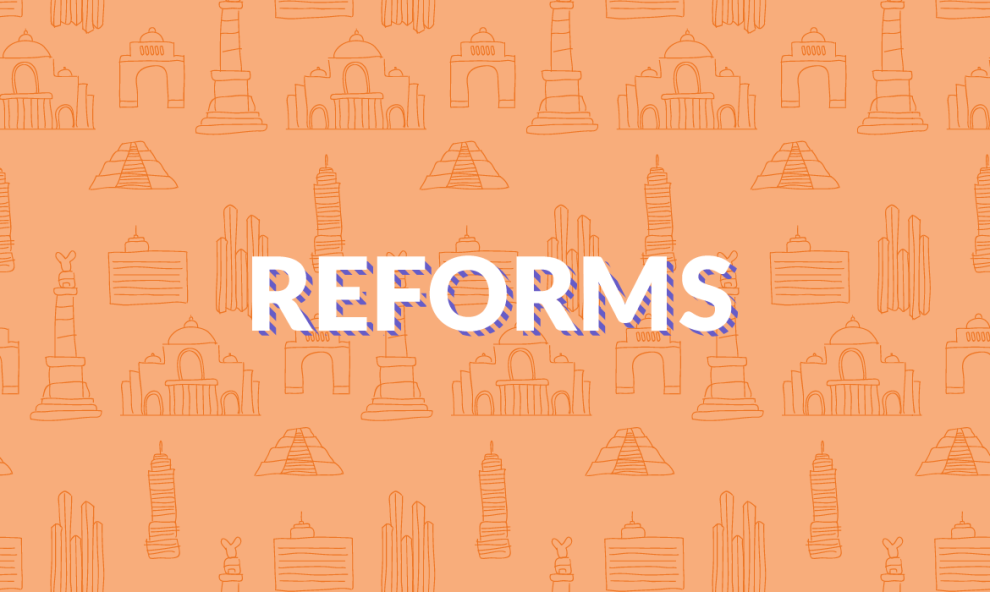Nehru, the great Indian statesman, said that “the moment has arrived, something that rarely takes place in history, when we take leave of the old and proceed toward the new, when an era ends, and when the cry of a nation, long suppressed, achieves its expression”. If ever there were something that unites Mexicans, it is the need to organize ourselves better in order to be capable of confronting the challenges of the future. This does not imply that it will be simple, or even feasible, to forge a consensus with respect to how this organizative structure should be, but it is clear that what we have is not working. Power reform has become an inexorable necessity, and, nonetheless, it is not obvious whether it will be possible.
The problems are enormous and the number of proposals for a solution, even greater. From the political end, approximately a year ago, the PRI party leader in the Senate postulated a proposal of reform drafted under the title of “The Eight Rs of the PRI”. At the end of that same year, the President dispatched a series of initiatives to the Senate directed toward reorganizing relations among the branches of government. With distinct areas of emphasis, each set of proposals responds to the difficulties and complexity that the country encounters in its decision-making processes.
Something similar occurs on the fiscal-economic plane. Although a discussion regarding the need for an “integral” fiscal reform (whatever that means) has been on the back burner for decades, the fall in petroleum prices has rendered this reform inexorable. At the same time, from the moment that the PRI lost their majority in Congress and later the Presidency, the reality of power has changed. This has been reflected in the relative power of the state governors, who currently exercise control over the greater part of the public expenditure. The meetings of the so-called conago, the confrérie of governors, were nothing more than an indication that the former power of the Presidency had broken into fragments, and the new reality of power would be reflected not only at the voting booth, but also in the distribution of monies.
In other words, the post-revolutionary pact launched by the PRI era resolved power problems and the distribution of finances throughout the seven decades that its reign endured. This age ended with the decision of the voters at the polls, but the institutions charged with administration of power relationships and expenditure distribution did not reform. This, and nothing else, is what lies behind the proposals for reform, both institutional and financial.
The clamor today is not due to a series of electoral, institutional, or fiscal reforms, but rather to an integral power reform. However profound and intelligent the proposals marauding around in the public debate, there is the risk of addressing a nonexistent problem, or, more precisely, that the problem is not being dealt with at its root. The risk that a package of reforms that does not clear up the problem will be approved should be of concern to us all. If the problem is one of power, it will not be resolved with new legislation, but instead with a deep-seated agreement –a broad political pact- that is subsequently codified into laws. In this instance, the order of the factors does indeed modify the outcome.
A power reform implies redefinition of what is fundamental in a society. Everyone is aware of the dysfunctional relations between the congressional and the executive branches of power. No less important are the distortions in the power relations between the federal government and those of the states: the old rules no longer work. The reality of power has made possible an evident disability at the Federal level (Congress and Executive) for the governors in terms of accountability. The public expenditure pours forth, but responsibility does not. In the same fashion, the capacity has disappeared that characterized the former political system to articulate agreements and consensuses that rendered the country governable. Part of the present situation reflects the disabilities of specific notables, but the structural problem is real.
The citizenry, who for the first time have a voice, albeit limited, also clamor for their rights. The rejection of tax increases is not only a reflection of steep living costs or limited incomes, but also of deep-rooted dissatisfaction with the performance of the economy, of the government, and of their own exclusion from the decision-making processes.
All of these points of conflict, controversy, and displeasure speak of a country whose day-to-day operation has ceased being functional and requires a new pact that establishes, or re-establishes, equilibrium among public powers and between the Federation and the States. There would be several ways to come to grips with this problematic: One, that which has been exercised to date, with proposals and counterproposals that do little more than lard the legislative agenda, without offering the least possibility of resolving the basic problem. A second would comprise setting forth a great political pact, of the sort that comes about only once every century, one that establishes the foundations of a general transformation of the country. The third, which entails the greatest pragmatism of all, is that which has oriented dozens of nations facing similar situations (watch Brazil and India, China and South Africa as obvious examples), and would imply sufficient rectification in the short term to enable a break-through of the current impasse to create the conditions for a more durable long-term arrangement.
In general terms, politicians prefer the former, because it provides them with an exceptional starring role, whereas academics and benchwarming politicians prefer the second, because they take in the panorama as a whole and prefer a complete solution to a patchwork approach. And finally, the third is the option of governments in functions that opt to favor the daily functioning of their society rather than magic solutions that, in politics, rarely exist.
The case of Brazil is enlightening. The Brazilian political system is as dysfunctional as ours (although this is attributable to very distinct reasons and characteristics), and notwithstanding this has achieved pragmatic continuity among governments of distinct credos and, more importantly, has entered into a process of movement that stands in contrast to our paralysis, and one that compels it, due to the very fact of its being in movement, to reform to the least extent necessary to sustain the momentum.
It would be extraordinary to be able to achieve a great foundational pact, but it is evident that the conditions under which this could take place do not exist at present. As Roger Bartra recently explained so brilliantly, in Mexican politics coincidence does not exist even concerning the times in which we live, and there is much less synchronicity for laying the foundations of anything relevant. It would be better for us to seek out the repairs that would make possible getting the machine into running order, to facilitate an integral power arrangement in an opportunity at which this would be feasible.
Power Reform





Comments